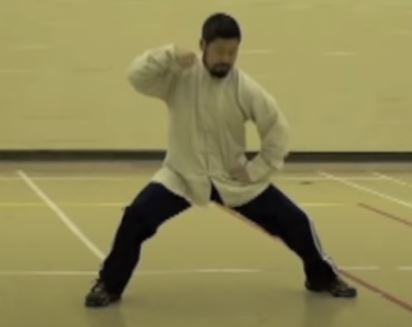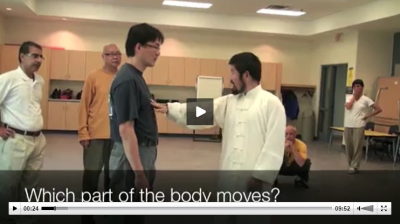qq discussion transcript
Wilkin: 04:07:11
I feel awareness is a broad term and can mean many things. If I am saying I am maintaining my verticality in yilu through awareness, is this the same awareness that Master Chen talk in the video?
Portland-Carlos Hanson: 04:27:11
I don’t think “maintaining my verticality in yilu through awareness” is the same thing Master Chen talked about. There are many things we need to be aware of and work on as we learn Taiji, but in the beginning we can’t be hung up on anything we think Taiji means. Technically, as we advance, the same thing applies.
The positive circle: elbow in, turn waist, hand out. Taiji is simple. No magic. Yes, we add to it: open kua, don’t move, rotate. If we are not aware of these things it will be difficult to learn, but we don’t need to add extra things beyond the physical.
It sounded like awareness, in the video, crossed over to “intent” which is an intangible used in other systems. You don’t need “intent” to do a positive circle.
Chen Zhonghua: 06:58:58
You don’t need awareness either, Carlos.
You only need to remember and execute instructions.
Portland-Carlos Hanson: 07:06:04
I guess, to me, I have to be aware of something, even if it is the instructions.
Chen Zhonghua: 07:06:54
That is why you (people) have a hard time following simple instructions.
Upshaw: 07:10:25
So, in maintaining my vertical line, as an example, what is important is for that one thing is the stretch between the changqiang and baihui…so is awareness the same as “just do it”?
Portland-Carlos Hanson: 07:10:40
You told me I was dropping my hand and didn’t know it. Don’t I have to be aware of my hand to not drop it?
Portland-Carlos Hanson: 07:11:29
Or more specifically aware of where my hand is?
Chen Zhonghua: 07:12:12
To be more precise, you only need to “remember” the instructions. You don’t need to “know”, “Aware”, etc.
You don’t need to be aware of anything. You need to remember the instructions and then have ways to ensure that they are followed. That does not include aware.
Remember that I have said again and again, people thnik they are not stupid, they think they know and that is why they cannot learn taiji.
For example, you don’t need to be aware whether your vertical line is stretched. You need some one to take a look at it while you are doing it.
On other occassions, I have said that we should not trust ourselves at all. That means the same here.
You have to remember that normal people can learn taiji but they will not GET it. Because they use normal ways of thinking.
Normal ways of thinking is to do everything and evaluate everything by themselves. They are totally self-aware. That is a human feature.
Only in recent years (several hundred) people became scientific and that does not include trusting ourselves. That relies on external means for varification.
A yardstick is used by me as examples all the time.
Portland-Carlos Hanson: 07:17:58
I agree. I know I have gotten caught in thinking I know. This is why it is so important to learn in person. There is a big difference between verbal and visual learning and physical learning.
Ping Wei: 07:20:31
This is one example that I ran into trouble when I used “awareness” to keep my head up. I thought I knew, I was fully aware, but my head still tilt forward/downward. After all, head up is head up, physically you need to achieve, not just aware.
Portland-Carlos Hanson: 07:24:44
Ok. So I can now see how touching the finger requires no awareness. You just do it. When the finger is not there, you still just do it. Even saying that with understanding makes my head hurt.
Upshaw: 07:35:46
Often times, what I think i am doing and what is actually occuring are entirely two different things…same as Ping said…point taken, there is no awareness because it holds poor validity and reliability…
Chen Zhonghua: 07:37:57
I remember in 2009 Victoria Taiji Traditions Camp a student was working with me, when I gave her the instructions, she refused to follow them. When I insisted on her executing the instructions repeatedly, she started to cry. Later on I found out that it was because she thougt/was aware/knew through her own thinking that she could not do what I told her.
But the fact is that it was all in her head. It was a simple instruction.
Awareness is never useful in taiji. Later on at a higher level, you will make your opponent jump without even knowing why. Just following the rules, the routines, and other instructions you have learned.
Upshaw: 11:15:06
Thanks for the lesson Shifu.
Portland-Carlos Hanson: 12:17:25
I second the thanks. I know I have heard this before. If only I could get it the first time.
Chen Zhonghua: 12:18:56
Just remember that once you “get it”, meaning get the ability through following instructions, you can do or say whatever you want. At that time your ability will back up whatever you say/think, even if they are wrong.
Portland-Carlos Hanson: 12:21:16
I find that a little scary, since I’d prefer not to be wrong.
I guess the key would be to pass on the instructions independently of what I think.
Chen Zhonghua: 12:22:15
That’s why it is very difficult to learn. Masters with some skill can convince people to listen to their wrong instructions easily.
That’s right.
That’s what I have been trying to say all along.
Don’t add or subtract from the original instruction.
Portland-Carlos Hanson: 12:23:47
That is an important lesson.
I am trying harder to be stupid about learning Taiji. I know I have a mental conflict between what I think and the instructions I hear. And you have explained that problem many times.
Toronto – Kelvin Ho: 13:15:00
Most of us would tend to replace the instructions with our own words. I know I do it but I notice it more when I do it now, then I try to go back to the original words.
Vancouver – Wilkin: 13:36:37
Maybe ‘pride’ is the issue here, not wanting to admit being wrong. Zen people have an advice to cultivate doubt instead. Always doubt your understanding and keep looking for the correct move.
Upshaw: 13:59:03
…interpretation is infinite and the method is precise…
Portland-Carlos Hanson: 14:22:53
I think it is not having the external measure. Not realizing how important it is. For me, not realizing I’m wrong. Thinking I am right and not admitting wrong are two separate things.
Portland-Carlos Hanson: 14:26:22
I have to guard against incorporating new understanding with the old and having a new wrong that I think is right. “Don’t add or subtract from the original instruction.”
Toronto – Kelvin Ho: 15:09:39
We should keep testing what we are doing and never think we get it as we will never be perfect.




{ 1 comment… read it below or add one }
Too much theory, just elbow in, turn waist and hand out. :p